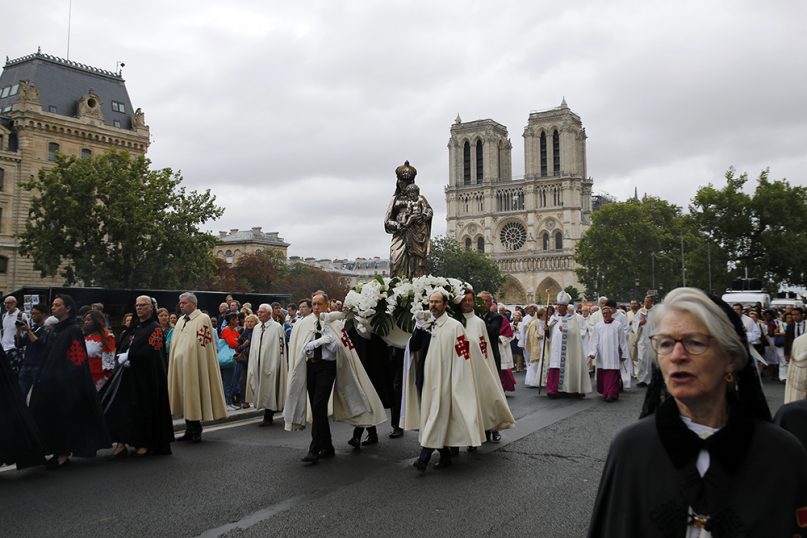(RNS) — On April 15, 2019, as the world looked on in stunned sadness as flames engulfed the Notre-Dame de Paris cathedral, I found myself realizing how much I connected this cornerstone of Western cultural heritage to Quasimodo and countless rom-coms and how little it put me in mind of its patron, Mary the Mother of God.
I recalled a line from a speech by the author Walker Percy: “One gets too accustomed to names.”
In that speech, given on receiving the Laetare Medal at the University of Notre Dame in 1989, Percy, a Catholic convert, offered a brief reflection on his own experience with the words “Notre Dame.”
A Protestant boy in 1920s Alabama, Percy relished the batch of football tickets his father would score every fall to college football games around the South: Ole Miss vs. Tennessee, Georgia vs. Auburn, etc. “And then came that strange name unlike all the others — Notre Dame. What is that? I asked. I don’t recall any satisfactory explanation of what it meant.”
RELATED: After last year’s COVID closures, pilgrimages resume to honor Virgin of Guadalupe
Catholics may take this in with astonishment, but the Protestant formation of my youth left me, too, largely ignorant of the Mary who has permeated art, theology and practice since the dawn of the Christian era. Protestants de-emphasize Mary to a rather stunning degree, largely to elevate the sufficiency of Christ and because they consider the Bible’s mentions of her relatively scant.
Not only was she not special, I gathered from the adults around me, she was distinctly un-special. To give her any reverence was to take it away from Christ himself.
As a theology student, I grew to detest Christian doctrines about Mary. The ancient doctrine of her perpetual virginity seemed obsessive and contrived. The immaculate conception — the tradition, of a later vintage, that held that Mary was born without the taint of original sin — offended my liberal theological leanings. It smacked of the “make it up as you go along” Protestant justifications I had come to sneer at.
Most of all, though, my commitment to materialism and naturalism prevented me from accepting the virgin birth of Christ and, by extension, several other central tenets of Christianity itself.
Two years ago, in a feature in Christianity Today titled “The First Christian,” Jennifer Powell McNutt and Amy Beverage Peeler, professors at Wheaton College’s School of Biblical and Theological Studies, offered an astute reconsideration of evangelical Protestant treatments of Mary. They argue that, while in their view Roman Catholics elevate Mary beyond what the Bible prescribes, Protestants rob themselves of theological treasures by demoting the Blessed Virgin.
More progressive and radical theologians have broadened Christian conceptions of Mary by focusing on issues of economics, migration and identity, making her a more complex figure than even many Catholics were taught to honor.
Indeed, Mary is everywhere one looks these days. She and the Holy Family have become a reference point this Advent. Last week brought oral arguments in a Supreme Court abortion case that focuses on the legal status of human life in the womb.
In November, Taylor Swift released an updated version of her breakup song “All Too Well,” reinitiating a debate about age-gap relationships. Tradition holds that St. Joseph was considerably older than his virgin bride. Does the Holy Family offer insight into relationships between men and women?
I may always find it impossible to affirm doctrines about the immaculate conception or her perpetual virginity, but reducing Mary to an incubator or Nativity set figurine, then theologizing based on her technical sexual status, misses the point completely.
Mary is kind of a big deal.
Even if you think specific scriptural citations are few, you cannot deny that they are rich and deep, revealing a woman of exemplary reverence, faith and devotion who was undeniably a central figure in the unfolding drama of God’s story of deliverance and redemption, in the life and work of Jesus himself, and in the founding and life of the church.
In a religion that is, at least in its traditional and orthodox expressions, inherently committed to notions of fatherhood and sonship, elevating the most important woman in the story is vital. Protestant theology could do with less Eve and more Mary.
The ruin of the Notre-Dame cathedral, our ceaseless debates, our complex family relationships and our longing for human and divine connection all call to mind Our Lady.
I now regard the senseless, unnecessary and insulting demotion of Mary as yet another misguided Protestant critique of Catholicism, and one that crumbles under even modest scrutiny.
RELATED: Mary, mother of Jesus, returns as an icon for pop stars and social justice warriors
When Percy recounted his football story for his Notre Dame audience, he recalled finding it extremely touching even as a small boy that the university and team “should call itself quite simply and by the two lovely words, Our Lady. I still find it so.”
So do I.
Given her inspiration and comfort to untold millions, I now consider myself the strange one for being so dismissive and disdainful of any who would seek her intercession to “pray for us sinners.”
This Christmas season, and especially on the Feast of the Immaculate Conception, it is worth recalling the words of Luke’s Gospel: “But Mary kept all these things, and pondered them in her heart.”
We could hardly do better.
(Jacob Lupfer is a writer in Jacksonville, Florida. The views expressed in this commentary do not necessarily reflect those of Religion News Service.)





